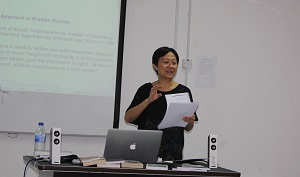21 Jul Practising what is preached in mission training
By Yeap Boo Yam
It has been said that where mission work is concerned, the calling is divine but the relationship is very human. By extension, mission training should be a good blend of the core principles of theology and the practicalities of everyday life.
It is on this premise that Asia Gateway Training (AGT) kicked off its seven-week residential programme on cross-cultural mission training at Seminari Theologi Malaysia in Seremban on June 21.
Twelve students from five countries completed the three-week Level 1 training on July 10 before nine of them embarked on a week-long mission trip to Cambodia.
On their return from the mission trip, they were joined by six more church leaders and ministry workers for another three weeks of training under the advanced Level 2.
AGT Dean Lee Loun Ling said the seven-week programme was designed to give the best of both worlds – solid academic training and practical field lessons.
“AGT intentionally avoids the two extremes of being either very academic or very practical. We believe in giving a good mix of the two, somewhere in between,” she said at the start of Level 1.
True to form, AGT provided the Level 1 trainees with two meaningful field exposure trips in between their intensive classes.
They visited the Kenosis Drug Rehabilitation Centre in Mantin, Seremban on July 4, and the Buddhist Maha Vihara temple in Brickfields, Kuala Lumpur a week later.
During the temple visit, they had a dialogue with the Chief High Priest of Malaysia, Ven. Datuk K. Sri Dhammaratana, and the patron of Buddhist Maha Vihara, Vijaya Samarawickrama.
Several trainees from overseas said it was an insightful engagement that gave them a better understanding of Buddhism.
Alan and Alexis Hamilton from the United Kingdom said it was enlightening to hear about the foundational beliefs of Buddhism from authoritative people.
“I found the temple visit very informative and insightful. It has been invaluable preparation for going to live in a predominantly Buddhist country,” said Alexis. The couple is going on a mission placement to Cambodia after the AGT Level 2 training.
As for the visit to the Kenosis Drug Rehabilitation Centre, the trainees found the excursion a timely reminder of the power of God at work.
A staff worker at the centre, Ng Tee Wan, shared the story of how the three-acre centre came into being through divine providence.
He said Kenosis had lost its drug rehabilitation centre in Ijok, Selangor in 2013 when the landlord decided to take back the land.
But out of nowhere, a kind-hearted Buddhist woman emerged as the good Samaritan.
“One day, this total stranger simply approached our students (inmates of the centre) who were painting the house of her friend and offered us her piece of land in Mantin.
“We are occupying this land on a 15-year lease for RM1 a year. She even spent her own money to clear this land for building the centre,” Ng said in his briefing to the visiting AGT trainees.
Clearly, the centre lives up to its name Kenosis, subscribing to the philosophy of emptying oneself in obedience to God.
Ng said a pre-requisite for admission to the centre is that a drug addict must be willing to repent and change as they don’t believe in forced admissions.
He said in order to achieve genuine rehabilitation, the trainees had to be healed and restored rather than just weaned off their addiction.
The message of hope resonates throughout Ng’s speech.
Listening to Ng, one can’t help but believe that however bad your circumstances may seem, there is always hope if you cry out to the Lord.
As Psalm 88:13 says: But I cry to you for help, LORD; in the morning my prayer comes before you.
Ng said spiritual input was important to prepare the students for life after their 18-month rehabilitation when they return to rejoin society.
“All our efforts will be in vain if they do not believe that only Jesus can heal them,” he added.
Thus, the rehabilitation programme is packed with spiritual disciplines like early morning devotion, worship, meditation, Bible study, cell meetings, and group sharing of their personal experiences.
Towards the end of their rehabilitation, the students are also sent out to do work therapy in the surrounding areas.
Ng said it is crucial for society to show understanding and love when dealing with former addicts trying to rebuild their lives.
In the words of Roger, a student at the centre, love and acceptance means the world to former drug addicts.
“The real challenge comes when we go back to society. For former drug addicts, even a simple smile means a lot to us. But a wrong word can cause us to fall again,” said Roger, who was recently baptised during his second admission to the centre.
To those seeking healing and restoration, take a leaf from Kenosis. Meditate upon His words and wait in His presence.
“We really thank God for this chance to help transform the drug addicts,” said Ng.
The sprawling rehabilitation centre comes complete with animal farms, orchards and sports facilities. It has nine staff guiding 35 students but the centre can accommodate up to 43 students.
“If it’s not God’s work, I don’t know what is. From our experience, we know that if God is at work, we just have to follow,” added Ng.



